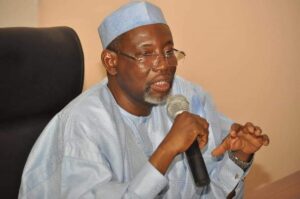

Experts fault hike in MPR, say it will affect real sector adversely
…Call for synergy between monetary, fiscal policies
By Seun Ibiyemi
Experts have faulted the recent hike in the Monetary Policy rate (MPR) by the Central Bank of Nigeria noting that it will have adverse effects on the real sector of the Nigerian economy.
The Monetary Policy Committee (MPC) had on Monday agreed to adjust the asymmetric corridor around the MPR to +100 to -700 from the previous range of plus 100 to -300 basis points.
The committee also raised the cash reserve ratio from 32.5 percent to 45 percent.
In a swift response to Nigerian NewsDirect, CEO of the Center for the Promotion of Private Enterprise (CPPE), Dr Muda Yusuf said the outcome of the Monetary Policy Committee meeting of 27th February 2024 would hurt the real sector of the economy which is already contending with numerous macroeconomic challenges.
He said an increase of the Monetary Policy Rate (MPR) from 18.75 percent to 22. 5 percent; and cash Reserve Ratio [CRR] from 32.5 percent to 45 percent poses a major risk to the financial intermediation role of banks in the Nigerian economy.
“The increase would constrain the capacity of banks to support economic growth and investment, especially in the real sector of the economy because the increases are quite significant.
“Although the decision was consistent with the typical policy response of the Central Banks globally, it failed to reckon with domestic peculiarities. The key drivers of Nigeria inflation are largely supply-side variables, and the CBN ways and means of financing.”
Dr. Muda said over the last two years, there had been persistent monetary policy tightening, yet there has not been any significant impact on the inflationary pressures. If anything, the general price level had been continuously on the increase.
“We recognise that the primary mandate of the CBN is price stability, but numerous headwinds have posed significant risks to this critical objective. Some of these include the surge in commodity prices and impact on energy cost, disruptive effects of insecurity on agricultural output, and global supply chain disruptions. The surge in Ways and Means finance also makes the CBN a culprit i n the inflation predicament over the past few years. The hike in MPR or CRR would not change these variables.
“Already, bank lending has been constrained by the high CRR which was until the latest review, 32.5 percent [many operators in the sect or claim that effective CRR is as high as 50 percent for many banks], the discretionary debits by the apex bank. The credit situation in the economy is already very tight, with lending rates ranging between 25 -30 percent. The Nigerian banks are yet to live up to their financial intermediation role because of these constraining factors.
“The Nigerian economy is not a credit driven economy, unlike what obtains in many advanced economies which have much higher levels of financial inclusion, robust consumer credit framework and strong correlation between interest rate and aggregate demand. The level of financial inclusion in the Nigerian economy is still quite low, access to credit by households and MSMEs is still very challenging, and the informal sector accounts for close to 50 percent of the economy.
“Private sector bank credit as a percentage of GDP was 14 percent in 2022 in Nigeria. It was 59 percent in South Africa, 30.9 percent in Egypt, 30 percent in Botswana, 51.6 percent in the United States and 130 percent in the United Kingdom. These underscore the variabilities across economies; thus, policy responses have to be different.
“The transmission effects of monetary policy on the Nigerian economy are still very weak. In the Nigerian context, price levels are not interest sensitive. Supply side issues are much more profound drivers of inflation.
“The new dramatic increase in MPR to 22.5 percent hike means that the cost of credit to the few private sectors that have exposure to bank credits will increase which will impact their operating costs, prices of their products and profit margins, amidst vey challenging operating conditions. The equities market may also be adversely impacted by the hike.
“It is thus imperative for the CBN to accelerate the process of increased capitalisation of the development finance institutions to create a concessionary financing window for the real sector and the small businesses.”
Dr Muda Yusuf added that to curb inflation, the federal government needs to fix the following: Address the security concerns causing disruption to agricultural activities, sustaining reforms in the foreign exchange market to stabilize the exchange rate, reduce volatility and stimulate forex inflows.
He urged the government to address forex liquidity issues through appropriate policy measures, incentives forex inflows into the economy, fix the structural problems to boost productivity and competitiveness of domestic firms, Address the challenge of high transportation and logistics costs.
He also added that the government needs to reduce fiscal deficit monetization to minimize incidence of high-powered money in the economy, Manage climate change consequences to reduce flooding and desertification.
Similarly, in an interview with Nigerian NewsDirect, Dr Samuel Nzekwe, the former president of the Association of National Accountants of Nigeria (ANAN), cast doubts on the Central Bank of Nigeria’s (CBN) latest move to combat inflation by raising the Monetary Policy Rate (MPR).
Nzekwe emphasised that tackling the country’s persistent inflationary trends requires more than just monetary interventions; fiscal strategies must also come into play.
According to Nzekwe, Nigeria’s inflation is largely driven by external forces, making it an imported phenomenon.
He pointed out that the CBN’s decision to increase the MPR could inadvertently raise the cost of funds within the banking sector, which would then ripple through the economy and increase the overall cost of doing business.
The hike in interest rates, a direct consequence of the MPR increase, could also have a chilling effect on borrowing. Nzekwe warned that this might dissuade both individuals and businesses from seeking loans, potentially stifling the real sector and slowing down economic growth.
Nzekwe identified the root cause of the inflationary spiral as the widening gap between the Naira and major foreign currencies, particularly the US dollar.
He identified that Nigeria’s heavy reliance on imported goods has been a significant inflation driver, putting undue pressure on the Naira.
To counteract this, Nzekwe called on the government to implement policies aimed at reducing import dependency and curbing the demand for foreign currencies, especially the dollar. This, he believes, would help stabilise the Naira’s value.
Moreover, Nzekwe urged the government to prioritise the creation of a favorable environment for the productive sector to thrive. By enhancing local production and increasing exports, Nigeria could earn more foreign exchange.
He also stressed the importance of bolstering security to encourage farmers to engage in agriculture once more, which would lead to an increase in food production and help ease inflationary pressures.




